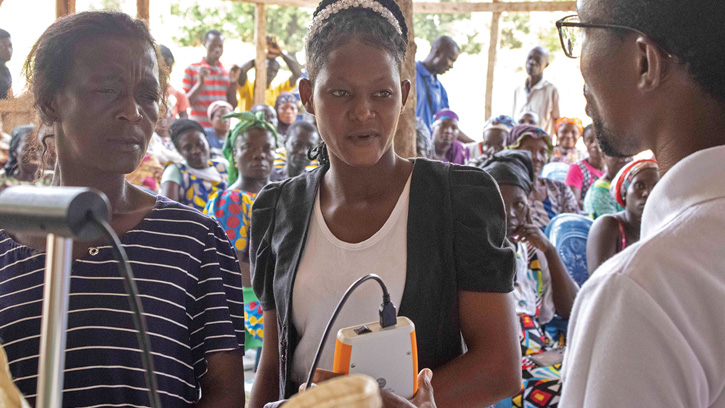Moisture Meter Tackles Mycotoxins in Ghana's Grains
Food Security | INNOVATIONS
Thanks to one young entrepreneur in Ghana, farmers can now access a low-cost moisture meter with a mobile app to keep their crops safe from mycotoxins. In Ghana and throughout Africa, the prevalence of mycotoxins in improperly dried and stored staple crops is a serious public health concern. Mycotoxins are secondary metabolites produced by certain molds that can naturally occur on crops such as maize, sorghum, and groundnuts.
Aflatoxins, one of the most dangerous types of mycotoxins, cause an estimated 5%–30% of liver cancer cases worldwide, with the highest rate in Africa at 40% (PACA 2020). Long-term exposure is also linked to stunting in children and immune suppression that increases susceptibility to HIV and malaria (PACA 2020). Even short-term exposure at high levels can cause acute toxicity and death.
Besides the health risks of mycotoxin contamination, there are also significant economic impacts. Strict mycotoxin limits in markets such as the European Union and the United States limit Ghana’s export potential for maize and groundnuts, in particular, resulting in a lost income opportunity for farmers. When farmers do export, only the best is sold, leaving the most contaminated crops for the local market, and putting Ghanaians at risk.
Since mold needs moisture to grow, properly drying crops and maintaining the dry state during storage is an effective strategy to prevent the development of mycotoxins (WHO 2018). These postharvest practices are especially critical since mycotoxins are heat stable and can survive food processing. Achieving a safe moisture level has long been a challenge in countries like Ghana, where smallholder farmers lack access to basic food quality tools such as moisture meters.
This opportunity was not lost on Isaac Sesi, then an engineering student at the Kwame Nkrumah University of Science and Technology (KNUST) in Ghana. While Sesi was an undergraduate at KNUST, the school had been working on a project to test a new moisture meter developed by Paul Armstrong, a USDA research agricultural engineer at the Feed the Future Innovation Lab for the Reduction of Post-Harvest Loss (PHLIL) at Kansas State University.
The PHLIL–KNUST collaboration aimed not only to develop a simple, low-cost moisture meter that would work throughout Ghana’s supply chain (which includes farmers, aggregators, commodity traders, and warehouse operators) but also to find a local entrepreneur who could develop a business around it. After Sesi, along with a team of his classmates, redesigned the circuit board and created an accompanying mobile app, he launched the GrainMate Grain Moisture Meter under Sesi Technologies.
GrainMate measures the equilibrium moisture content of seven different crops: maize, sorghum, millet, wheat, rice, soybeans, and groundnuts. The handheld device runs on two AA batteries and costs about $75 (GHS 600) (Sesi Technologies 2022), compared with the several hundred to several thousand dollars typical for commercial moisture meters. The mobile app notifies the user if a safe drying level has been reached for the particular crop being tested.
Since 2018, Sesi Technologies has helped over 2,000 farmers and agribusinesses and even collaborated with global partners such as the World Food Programme (Sesi Technologies 2021). The company has grown to 12 employees and supports additional jobs by having the parts produced locally (Sesi Technologies 2021).
While Sesi Technologies has won several awards for innovation and impact, the real win is in its promise to make mycotoxin contamination a thing of the past in Ghana.


